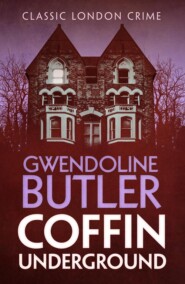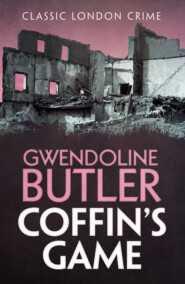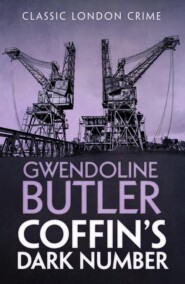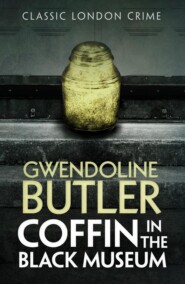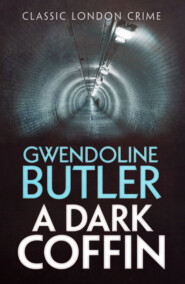По всем вопросам обращайтесь на: info@litportal.ru
(©) 2003-2024.
✖
Cracking Open a Coffin
Автор
Год написания книги
2018
Настройки чтения
Размер шрифта
Высота строк
Поля
Many of the old warehouses of the former docklands had been converted into smart apartment blocks, but old streets and grimy old housing estates still supported the old poor who eyed their new rich neighbours without love.
It was no easy area to police, with violence never far below the surface and always threatening to break out. A large garage attacked only yesterday. A few days ago a robbery with savage violence in a shop in the Tube station in Spinnergate, two badly injured, a crime that was still being investigated, no leads.
On the two large housing estates which were separated by a railway line and a belt of expensive upper-class apartments, gangs formed, fought each other, and the police too if they could, then melted away as fresh and younger outfits took their place. The Dreamers, once the most powerful group, had gone into decline when several members had been sent to prison and another couple had married, which as far as active gang life went came to the same thing. This had left the field to their rivals, who called themselves The Planters after the Planter estate where most of them lived. But somehow, without the competition, The Planters too had gone into decline. With no one to fight, what was the point to being? There was a short-lived revival of Dreamers Two, but it failed to inspire. Either the police were getting quicker to stamp out trouble-makers or the gangs were getting weaker. Who could say?
At the moment there were no big gangs, but Coffin had heard stories of a new one forming itself around a female leader. He believed it.
He had not met her yet, but no doubt he would if she became powerful enough. He had heard she was called Our General.
Such was the Second City where John Coffin held the Queen’s Peace and in which he lived.
‘You can’t think,’ said Philippa, ‘how hard it is to find women warriors who can sing.’
Wonder if I should suggest she tries Our General, thought Coffin.
‘I’m not sure if I like the Valkyrie concept anyway,’ said Philippa. Under the influence of the Drama Department, whether she admitted it or not, she had started to intellectualize her reactions to plots and story lines. ‘I mean, I don’t know any.’
They exist, thought Coffin.
Philippa finished her coffee, looked regretfully at a plate of chocolate croissants, but she mustn’t, she really mustn’t, that last inch on her hips since she had given up being a vegetarian was one inch too many, and got to her feet. ‘I must be off. Got an appointment with the Head of Drama at the university, he’s going to help me find some extra Nibelungs. I could do with some really short, dwarflike men with good voices.’ The Head of Drama was a handsome man too, she was looking forward to the half-hour together. She picked up her bags, Philippa always travelled with a full complement of shoulder-bags, clutch bags and the odd plastic carrier. Her mood was good in spite of the difficulties with the Valkyries. She would see her beautiful young musician, he had promised to be there, bringing a few young male singers to audition. It was wonderful how a family growing up and leaving home emancipated you. I am a New Woman, she announced to herself.
‘I’ll hang on a bit longer,’ said Coffin. He watched her departure with indulgence and a touch of sympathy; he could guess her motives. There was one thing about being a policeman: you often knew more about your friends and neighbours than they guessed. He knew about the young conductor, Marcus Deit. He even knew more about Marcus than she did, but that would be telling. ‘Goodbye.’ He was glad to sit thinking.
‘They have been gone two days. This is day two and we are into day three, and nothing, not a word. With students, you never know, just gone off, you say to yourself. But she’s my child, my child.’ He could hear the man’s voice, rough with worry. ‘And her car has been found.’
John Coffin would not normally have been concerned with the story of the missing students. Or not so soon. The Chief Commander of the Second City Force had access to all information about what was going on in his difficult and lively territory. He was responsible for all and was meant to know all. That was the theory. As with the Queen, all important documentation came his way for signature but it took time. Reports were filtered through subordinates, prepared and then presented on his desk. His secretaries might do a bit of selection here too, he was protected and had to keep a wary eye on that protection. He knew that things were kept from him.
So he had developed the habit of just dropping in on departments. Of prowling round and asking questions. The CID inevitably got a lot of his attention. He couldn’t give up the habit; once a detective, always a detective. Also inevitably, this interest did not meet with the total approval of the CID teams, and although obliged to grin and bear it, they had ways of getting their feelings across.
Coffin had noted with amusement and understanding the tactics of Chief Superintendent Paul Lane and the wily manœuvring of Chief Inspector Archie Young. Young’s tricks were cleverer but Paul Lane got away with more: experience did tell, Coffin had told himself wryly while furthering the recent promotions of both men. The nominal head of the CID was Harry Coleridge, but he was a quiet, efficient administrator who would soon be retiring.
Jockeying for Coleridge’s position was already going on, but John Coffin was considering bringing in an outsider. What about a woman? Was there one? Yes, there was, he knew a name. Keep quiet, he told himself, and watch events. He had learnt politics, willy-nilly, in his job.
But in the matter of the missing students he had not had to go out and ask: he had been dragged in on Day Two of their disappearance. In person.
He got a notebook out of his pocket and put a photograph of the missing girl on the table before him.
There she was: small, dark-haired, not really pretty but interesting, a good face. Amy Dean, nineteen years, with a birthday coming up next week if she was still alive to enjoy it.
She had been snapped against a background which he recognized as the University Senate and Library, she was sitting on the steps in the sunlight with a bag of books at her side and the columns of the portico showing behind her.
The older buildings of the university were undistinguished, having been taken over from the earlier establishments from which it had been put together. Utility was all they aimed at, but the new blocks had higher artistic ambitions.
A grant from Whitehall, a subsidy from the Corporation of the Second City (which was fully alive to the prestige of its own university) and several private donations, had enabled a competition to be held to produce the best design.
The winner of the competition, which had been fierce and bitter, was a young American architect who had survived the battle between modernist architects, neo-modern architects, post-modern architects, classicists and the neo-classical men, and come out with what his critics called ‘nostalgia’ architecture. His building was pretty and much loved by the students. Oddly, since the whole was built of pale stone and wide open, the new building had not suffered the ravages of graffiti writers or vandals. Perhaps it really was too nice to touch.
A telephone call from the Rector’s office had got through to Coffin yesterday; he was on his own in his office, working late.
‘Tom Blackhall here.’ The Rector of the University (this was his preferred title as opposed to Vice Chancellor or Principal) had a pleasant, deep voice. He was Sir Thomas, recently knighted, but to John Coffin he said Tom, they were two heads of mini-states meeting on equal terms. John and Tom.
Then he got down to it, with the briskness that he was famous for displaying: Would John come round, there was something he wanted to consult Coffin about?
Coffin was cautious. ‘I’m just finishing off a piece of work.’
‘I’d appreciate it.’
It was important, then. A small prickle of apprehension started at the back of his neck and ran down his spine.
Students, trouble.
Once the words had been synonymous, but that had been some time ago, all had been peace lately, students were keeping an eye on their future, jobs and income alike. There hadn’t been a student riot, march or sit-in for years now, so perhaps they were due for one.
But no, the anxiety he had picked up in Tom Blackhall’s voice had sounded personal. Like someone threatened with a terrible illness.
‘I’ll walk round.’
‘Let me send a car.’ The university had several official cars, Coffin had one himself, which he avoided as much as possible, preferring to walk or drive himself.
‘Rather walk.’ His security code name was WALKER.
‘My house then, not the office. You know where it is?’
‘Yes.’ You asked me there not six months ago, to a dinner-party where your wife was, for once, present. You’ve plainly forgotten.
‘Come straight in, then, I’ll leave the door unlocked. My study’s on the left.’
In the days when he had been a uniformed copper on the beat, at the very beginning of his career, he had thought wistfully about those of his contemporaries whom he knew to be at their university studies. In those days he had thought of dons and students as living civilized, intellectual days, engaged in reading, studying, passing their days in a solid manner, then drinking fine wine at college dinners while engaged in good conversation. Nothing trivial, nothing mean.
He knew better now. University life as life in an ivory tower did not exist, had possibly never existed except perhaps for a few people in one or two places for a short time in the settled period between the wars. Now the centres of learning were centres of hard, competitive work, with as much rivalry and edging for position as anywhere else. And they had to fight for money with all those other institutions like the arts, the hospitals, and the police.
Mind you, they were doughty fighters and Sir Tom one of the best. Coffin had learnt to respect the way he and his like operated.
He had walked fast through the streets, enjoying the air and the movement. Soon, he saw the stone archway of the university buildings ahead of him.
As he came through the archway a motorbike shot past, just missing him. The rider was a girl wearing black leather and a black crash helmet. She had a lean, muscular face without much expression, but he was almost sure she had known how near she had come to hitting him and was enjoying it. Damn you, he thought, as he walked on.
Tom Blackhall had come forward with hand outstretched as Coffin walked into the room. ‘Glad you could make it. Decent of you to come.’
There was another man in the room, looking out of the window, his back to the door. He swung round at that moment, and Coffin took a step backwards in time.
For a second he could not speak, this was a face from the buried part of his life, his unhappy, married, struggling youth. This man had walked a beat with him, been a partner, but left the Force, and been heard of as from a distance as a very successful business man. He had vague memories of hearing of a marriage that had failed. Well, that made two of them, he thought.
‘Jem, Jem Dean.’
‘That’s me all right. I use James more now, but I’ll answer to Jim.’ Jem was dead and buried, it seemed, no doubt wisely. Change your name, change your status.
They looked at each other, seeing reflected in their eyes that past they had shared, not all of it good. Jim Dean moved his thin, rather beautiful hands in a way Coffin remembered. Wonder what habit I’ve still got that he recalls, Coffin thought. What empty shell hangs on me?






